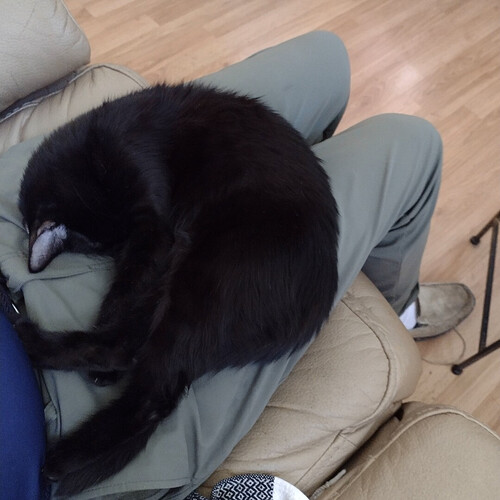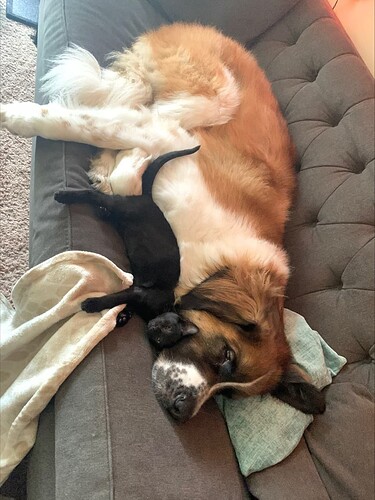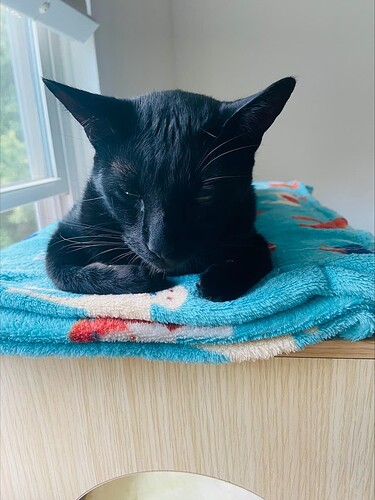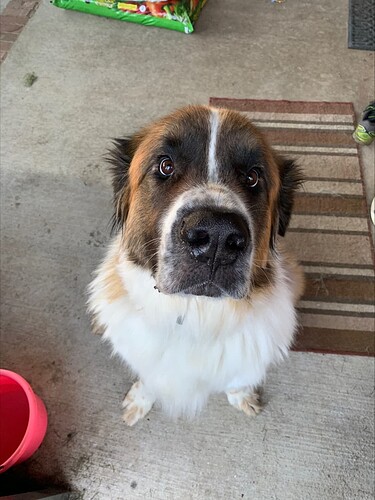Haha, probably not unless I was going to a medical conference in Europe.
What particular interactions are you speaking about?
A Cochrane review supports your findings.
Other than just experimenting when cannibus was legalized in my state, I have tried various CBD oils on joint aches and pains that occurred after my covid shots and felt no improvement.
I have asked various acquaintances at the gym I go to, a small sample size, and none have raved about it.
A lazy Monday afternoon. A cat on my lap, Google Scholar, and Rapamycin News on the big screen, and enjoying the great info and comments from forum members
Only thing missing is a good glass of wine.
I have that same cat! There’s dog people and cat people. Cat people, I’m told, live longer by about 25 years.
Awe! Cute!
Is that a domestic shorthair? I have one too, he is 2 years old.
Have you given it rapamycin and if so how was has it been? I am thinking about giving my cat some soon.
My dog (leonburger/st bernard mix) is 5 (turns 6 in october) and he has been on rapamycin for 6 months now( 3-4mg a week) and has done great on it! No side effects or anything, blood work looks good to0.
I have two rescue cats/kittens. They are somewhere between 7 and ten months old, so I plan on waiting until they are about one year old. I don’t have enough information yet to feel comfortable about the dosages. For convenience, I will be looking into once-a-week dosing.
Over the years I have had several dogs and cats and loved them all. For older people, cats are lower maintenance. “Dam fido, I don’t want to go for a walk!”
Related Sleep Study:
I’m super excited to give gapapentin a try when I get home from this Alaska cruise. I had no idea it was used off-label for sleep and I’ve already tried just about every sleep supplement/med known to humankind.
Wonderful pets! They do make our days brighter.
Love that dog face. Who wouldn’t love that.
I would advise anybody with anxiety that is unexplained to get a hair test. Chromium and magnesium could help if low.
I’d actually advise it for everybody. Minerals are very important and it is hard to know where you are without an objective test. Blood tests don’t work so well for this.
They just dissolve your hair in a solution and dump it into a machine for $100.
Magnesium is very important because it can eliminate DNA R loops which are very destabilizing and can lead to both cancer and neurodegenerative diseases.
CR also does this and is one of its primary health benefits.
I should explore for magnesium. My doc keeps beating me up on RBC magnesium levels even though I take a lot…then I realized the blood tests are meaningless re cellular iron.
So I found a nutritionist local who will do the complete hair analysis, including that elusive magnesium I am so chasing. She confirmed the RBC blood test is…meaningless. “Most every western medicine doctor has NO idea about the relationship between mineral intake/deficiency and and blood test results”
Can we just mail her a sample and maybe pay with a card?
Yup. I collect my own sample and send it out, she gets the report, then we do a consult.
I will relay details.
But surely this must exist local US? This was widely offered as a test when I googled. She may provide better value/insight with the consult, but perhaps local shops offer same…docs versed in this science.
Maybe so. I’ll check it out.
I generally fall asleep without much difficulty. I dont suppose any sleep supplement will do much for nocturia related to BPH. I’ve tried magnesium, cannabis gummies, theanine, gabapentin. Despite minimal fluid intake past 6pm, I invariably awaken after about 5 hours with a full bladder.
When I used higher doses of gabapentin, 300-600 mg, I did sleep deeper and longer before awakening to urinate. Occasionally it would get me through the night. But I built up a tolerance to it quickly and dont use it now except rarely and at small, mostly ineffective 100 mg dosage.
One approach I havent tried yet because it seems too tough and because I’m not convinced. I learned of this from a video by Dr. Eric Berg DC. He asserts that nocturia is caused by late meals and late snacking, which raises insulin, which inhibits adrenal hormone that holds urine. I do eat late and graze up to an hour before bed. This increases my productive hours and helps me keep weight on.
If there is merit to Berg’s approach I’d be willing to eat an early dinner and get my calories earlier in the day. Thats a lot to ask. Any thoughts?
Not quite sure what he’s talking about. ADH is a pituitary hormone that the kidneys use to retain water. If it’s inhibited then you’ll have excessive urination, including nocturnal.
I don’t think that it’s related to insulin.
I never had sleep issues until I went into perimenopause/menopause. After spending 3 years in a sleep deprived daze, I finally figured out the hormones may have something to do with it.
I went on HRT and things improved dramatically. Even with HRT, about half the time I awaken at about 2AM for an hour. I eventually go back to sleep and I don’t feel tired the next day, but It’s just annoying.
I came across a BBC documentary called ‘The Truth about Sleep’.
The presenter tested a few sleep remedies, and one of them was a prebiotic (brand name ‘Bimuno’) which is essentially Galacto-oligosaccharides.
I thought ‘what the hey, I’ve tried everything else’ and gave it a go.
Taking the GOS powder before bed dramatically reduced the number of early morning wakings for me, not sure why but I’m not complaining!



